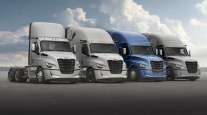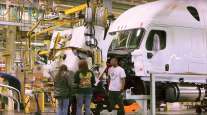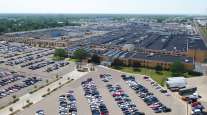Senior Reporter
New DTNA CEO John O’Leary Notes Industrywide Challenges, Strong Demand for Company's Brands

[Stay on top of transportation news: Get TTNews in your inbox.]
In the months since taking the CEO reins at Daimler Trucks North America, John O’Leary has watched the trucking industry deliver a response he described as “remarkable” to the unprecedented disruptions of the COVID-19 pandemic. He believes emerging opportunities and lessons learned position the industry for recovery and growth.
“I think everybody has more business than they know what to do with and more trucks than they can find drivers for,” O’Leary told Transport Topics editorial staff during a June 2 virtual interview, noting that his company’s customers are doing, “pretty darn well. I am not aware of any that are really struggling.”
During a wide-ranging discussion, O’Leary — a longtime Daimler executive who took over as CEO at DTNA from Roger Nielsen on April 1 — said opportunity awaits trucking as the emergence of electric and hydrogen fuel cell technologies continue to advance. And he sees room for both in the industry.

Nielsen
“It’s not an either or. It’s going to take both, ultimately,” he said. “But it is hard to handle both at the same time, whether you are a customer or a truck maker. So you need partnerships. A lot of investment [in fuel cell development] is required, a lot of relationships and politicking involved behind the scenes to get things approved and rules changed.”
Daimler Trucks and Volvo Group are partnering on a joint venture called Cellcentric to advance fuel cell technology. He noted that fuel cell technology is further along in Europe, while battery-electric has more momentum in the U.S. market. O’Leary said he believes there is a strong use case now for battery-electric trucks on shorter runs, but noted that the industry needs support from electric utilities to build and scale a nationwide charging infrastructure.
DTNA builds the Freightliner brand and Western Star models, and is adding the Freightliner eCascadia and eM2 electric models to its lineup. Its total share of Classes 6-8 in the U.S., Mexico and Canada hovers close to 40% — a level he said requires a variety of factors to maintain. Namely, he pointed to products, employees, service networks and customers with great businesses who are buying. But the company isn’t focused solely on the numbers.
“Chasing market share for the sake of market share, we’re not so interested in that,” O’Leary said.
That said, DTNA is looking to increase its penetration in the vocational market, with more new models on tap. It launched the 49X Western Star model in September and referred to it as the most-tested truck in Western Star’s lineup.

A Western Star 49x logging truck. (Daimler Trucks North America)
The 49X debuted as the industry was about to face a series of significant challenges.
O’Leary said DTNA is confronting the widely reported shortages in microchips and plastic parts, along with commodity prices for raw materials such as steel that are going through the roof. “Everybody is struggling trying to get product in the hands of customers,” he said. O’Leary noted that DTNA is not facing “widespread” problems, but said the situation has meant hiccups for some customers and production interruptions.
And there doesn’t appear to be a quick solution to end the shortages. “Tomorrow would be awesome, but that’s not going to happen,” he said. “Some people say it’s going to go into next year. I know a lot of people are out there trying to fix these situations and improve them.”
Longer-term, he said these shortages could provide a lesson in the risks of just-in-time inventory management, a cost-saving practice that, he suggested, businesses may have been relying on too heavily.
“It’s great as long as everything continues to work. But as soon as you have some big hiccup in the system, you are struggling,” O’Leary said.
He predicted there will be greater awareness of the critical parts in any technology chain so companies can ensure they maintain adequate reserves or, “other alternatives to work around things like [the microchip shortage] when they happen. So there are some good learnings here.”
Freightliner Photo Gallery

A Class 8 Freightliner Cascadia with SAE Level 2 automation. (Daimler AG)
O’Leary, who previously oversaw Daimler’s aftermarket business, also understands the importance of learning from issues tied to parts. He noted that how companies respond to recalls is a vital part of building customer trust. DTNA recently recalled more than 72,000 Freightliner Cascadia models over a faulty halogen bulb that may dislodge after replacement and potentially damage other vehicle components.
“Every customer I have ever spoken with — and I was responsible for the aftermarket for a number of years earlier — understands occasionally things go wrong for trucks in very difficult duty cycles — for most of them — and hard applications,” he said. “There are a lot of parts and any one of them can break.”
When something does go wrong with a supplier part or an engineered component, he said, “We are a very customer-focused company. Ultimately, it’s how you deal with the problem that really separates, differentiates yourself from your competition.”
Taking care of customers, O’Leary added, is the company’s key mission.
“We are going to continue to enable their success. We sold them a tool and we want our trucks to be the best tools out there for them to use.”
Want more news? Listen to today's daily briefing below or go here for more info:




